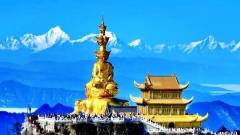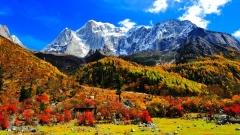When people think of Sichuan, hotpot and pandas are usually top of mind. But beyond the spice and scenery lies a peaceful tradition—the Sichuan tea ceremony. In local teahouses, you’ll discover a slower rhythm of life, where tea is poured with grace and shared in good company. It’s a unique way to connect with the region’s centuries-old culture and hospitality.
A Cultural Tradition Steeped in History
Sichuan is one of the oldest tea-producing regions in China, with a tea culture dating back over a thousand years. The capital, Chengdu, is often referred to as the “Teahouse Capital of China,” home to thousands of teahouses where locals gather to drink tea, play mahjong, and exchange gossip. These teahouses serve as vital community hubs, and the rituals surrounding tea drinking reflect the region’s social harmony and cultural pride.
Attending a traditional tea ceremony in Sichuan isn’t just about tasting the beverage—it’s about observing etiquette, appreciating the tea master’s skillful movements, and understanding the philosophy behind each step. It’s a cultural journey of the senses and the soul.
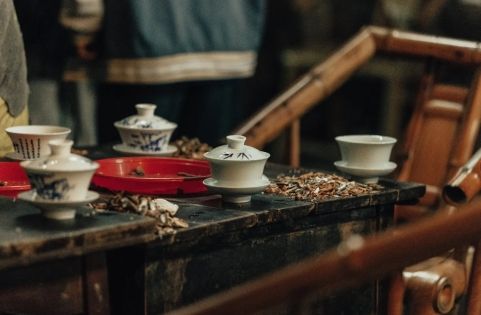
What to Expect at a Sichuan Tea Ceremony
Unlike the more rigid Japanese tea ceremony, the Sichuan version is relaxed, lively, and sometimes even theatrical. In more formal settings, such as at Wenshu Monastery or traditional teahouses like Heming Teahouse, the ceremony might be performed by a tea master dressed in traditional hanfu. You’ll sit at a low table, often on bamboo stools, with small porcelain cups arranged in front of you.
The ceremony usually begins with a cleansing ritual. The tea master gracefully pours hot water into each cup, warming them and rinsing them out before adding the leaves. Watching the long-spouted copper kettle dance through the air is an art form in itself—some tea masters even perform acrobatic-like movements while pouring water, a technique known as “Gaiwan Gongfu.”
As the tea steeps, the aroma fills the air. Guests are encouraged to admire the color and scent before sipping. There may also be a brief explanation of the tea’s origin and characteristics. This is your chance to relax, disconnect from your phone, and let the atmosphere slow you down.
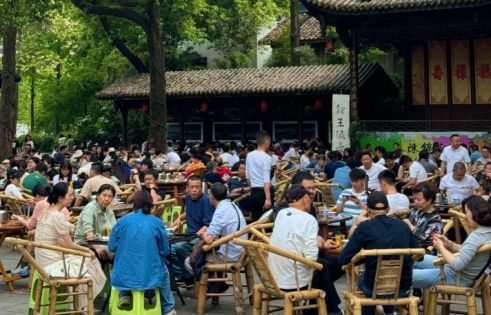
Types of Tea You’ll Try
In Sichuan, the most commonly served teas include:
-
Zhuyeqing (Bamboo Leaf Green): A delicate green tea with a fresh, grassy flavor grown in the Emei Mountain region.
-
Mengding Ganlu: One of China’s oldest teas, also grown on Mount Mengding, prized for its smooth, sweet flavor.
-
Jasmine Tea: Often used in more casual ceremonies, appreciated for its floral aroma and soothing qualities.
-
Dark Brick Tea: Especially common in Tibetan-influenced parts of Sichuan like Kangding and Litang.
The tea offered will often depend on the teahouse or the host’s personal preference. Some venues even let you choose your leaves from a selection.
Where to Experience a Tea Ceremony in Sichuan
You can find tea ceremonies in a variety of settings, from bustling public teahouses to peaceful gardens and temples. Here are a few recommended spots:
-
Heming Teahouse, Chengdu – Located in People’s Park, this iconic teahouse is perfect for observing local life while sipping tea under the shade of old trees.
-
Wenshu Monastery Teahouse, Chengdu – A quieter, more spiritual place to enjoy tea in a Buddhist setting.
-
Du Fu Thatched Cottage – This cultural site sometimes offers tea experiences that include poetry recitals and classical music.
-
Local teahouses in Leshan or Emei – After visiting the Giant Buddha or Mount Emei, stop by a traditional teahouse for an authentic taste of local culture.
Tips for Attending a Tea Ceremony
-
Be Present: The ceremony is as much about mindfulness as it is about tea. Avoid distractions and engage fully in the moment.
-
Ask Questions: Many tea masters love to share their knowledge. Feel free to inquire about the tea, its origin, and the techniques used.
-
Try the Local Snacks: Sichuan teahouses often serve traditional snacks like sunflower seeds, preserved plums, or sesame pastries alongside the tea.
-
Don’t Rush: Unlike takeaway coffee, tea here is meant to be savored slowly.
Join a Tea Tour in Sichuan
If you’d like to include a tea ceremony in your Sichuan itinerary, China Dragon Travel offers well-crafted Sichuan tours that combine natural beauty, historical landmarks, and immersive cultural experiences. Many of our itineraries include visits to teahouses, temples, and even hands-on tea-making workshops.
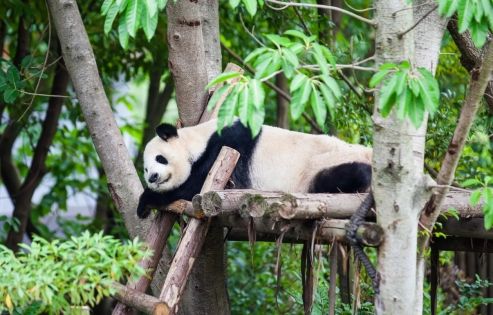
5-Day Sichuan Small Group Tour (Daocheng Yading, Kangding, Siguniang Mountain)
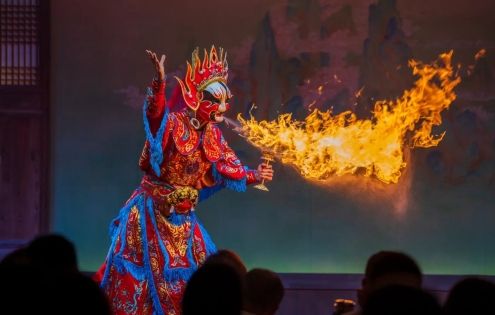
7-Day Chengdu, Jiuzhaigou & Mount Emei Tour
Conclusion
Attending a tea ceremony in Sichuan is more than just drinking a cup of tea—it’s about connecting with Chinese heritage in one of the most relaxed and authentic ways. Whether you’re seated in a bamboo chair in a public park or in a quiet monastery teahouse, the warmth of Sichuan hospitality is steeped in every cup.



